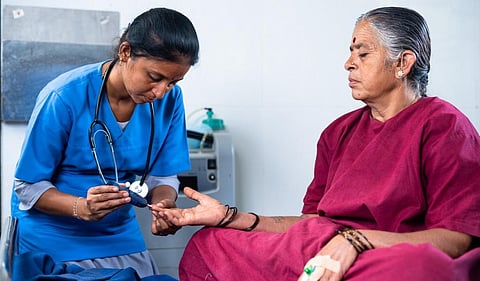

In 2021, nearly seven million people died globally as a result of diabetes, while $970 billion was the world’s quantified healthcare expenditure that year, according to a new report titled Diabetes Global Industry Overview 2023.
Currently, 537 million adults globally are living with diabetes, with three in four of them living in low- and middle-income countries.
Furthermore, more than 540 million adult people in the world have impaired glucose tolerance, associated with prediabetes, according to the report by Aging Analytics Agency, an analytical company focused on the topics of aging, geroscience, and longevity.
The report noted:
Globally, the level of undiagnosed diabetes is around 40 per cent, with most developed regions being at around this level. The highest levels of undiagnosed diabetes are in Africa (60 per cent), South-East Asia (57 per cent), and the Western Pacific Region (56 per cent).
The reason is that diabetes can frequently go undiagnosed for years unless detected during a routine screening exam and blood test. The diagnostic biomarkers for diabetes, as established by the World Health Organization, include a two-hour glucose level and fasting glucose level.
“We found more than 1,840 medical centres specialising in diabetes treatment. The US is the world leader in this market, containing 1,466 medical centres, or around 78 per centres of the world total,” the report said.
After the US, the highest numbers of medical centres for diabetes are located in India (58), Canada (51), the UK (42), Japan (29), and Australia (24).
More than 1,800 of the companies selected for analysis offer hospital services for patients with diabetes. Around 45 per cent of them specialise directly in diabetes treatment, while 20 per cent provide treatment for diabetes complications and an additional 36 per cent do not have any narrow specialisation.
These clinics provide a range of different types of services for diabetic patients, including diabetes treatment, prevention, screening, managing patients’ health and quality of life, residential and home care, and rehabilitation, the report indicated.
“We found more than 1,800 medical centres and clinics specialising in diabetes diagnostics. In the last 23 years, the number of clinics has more than doubled from 567 in 1999 to 1,329 in 2022,” the report said.
However, the market saturation of this type of service has been apparent since 2019.
The period between 2000 and 2007 represents the “industry breakthrough” era of diabetes diagnostics, with an average of 38 new clinics per year. The market then experienced a period of relative stability between 2008 and 2016, before a period of industry collapse from 2017 onward, marked by a reduction in investments and a marked decline in the annual number of new companies, the report stated.
In the last two years since the COVID-19 pandemic, 2021 and 2022, only 13 new diabetes diagnostics clinics have been opened, the report added.
“We found more than 530 companies specialising in diabetes diagnostics. The US is the leader in this market, hosting more than 65 per cent of diagnostic companies for diabetes (349 companies). The remaining 35 per cent are distributed fairly evenly among other countries. The country with the second highest number of companies is the UK (21), followed by India (17), China (11), and Australia (11), which together account for below 15 per cent of the world total,” the report added.